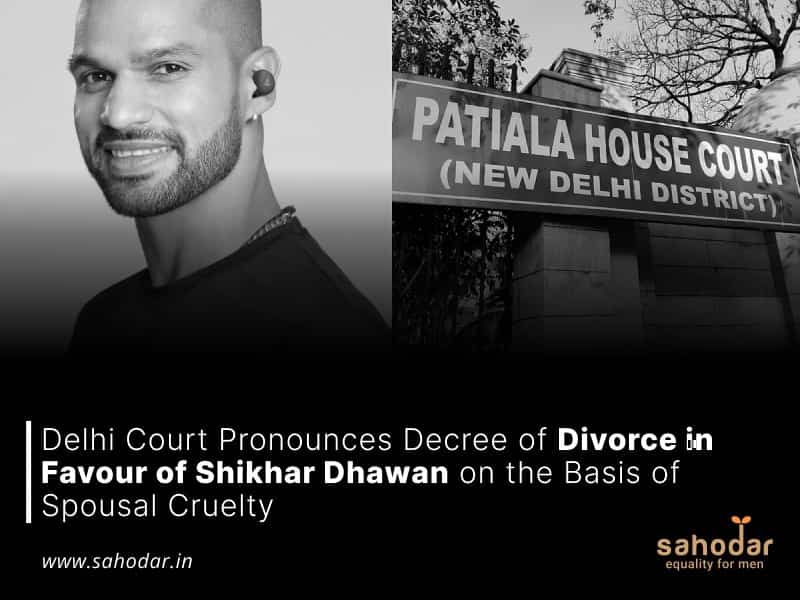Family Court Judge Harish Kumar accepted majority of the allegations made by Dhawan against his estranged wife and held that she subjected him to mental agony and cruelty.
In a judicial ruling handed down on Wednesday, a family court in Delhi adjudicated in the matter of Shikhar Dhawan versus Aesha Mukerji, subsequently granting the dissolution of marriage to cricketer Shikhar Dhawan on the grounds of alleged mental cruelty inflicted by his spouse.
Presiding over the case, Judge Harish Kumar ruled in favor of Dhawan on all counts presented within his divorce petition against his wife, as the wife either chose not to contest these allegations or failed to mount a defense.
The judge concurred that the wife had, by compelling Dhawan to live apart from their sole offspring for an extended period, subjected him to mental anguish.
Notably, while the court abstained from issuing a definitive ruling on the permanent custody of the couple’s child, it did accord Dhawan visitation rights. These rights encompass the privilege to spend a suitable duration of time with his progeny in both India and Australia, alongside the facilitation of video communication.
Furthermore, the court decreed that Aesha must arrange for the child’s presence in India for visitation purposes, including potential overnight stays with Dhawan and his familial associates, during at least half of the school vacation period within the academic calendar.
“Since petitioner is a reputed International Cricketer and has been pride of the nation, subject to petitioner approaching the Union Government of India, it is requested to take up the issue of visitation/custody of the minor son with its counterpart in Australia to help him have regular visitation or chatting with his own son or his permanent custody,” the Court ordered.
In accordance with Mr. Dhawan’s submission, his spouse had initially expressed her intention to establish residence in India with him. However, she found herself unable to fulfill this commitment due to a prior undertaking to her former husband, with whom she shares two daughters. This previous commitment obligated her to maintain her domicile in Australia, her present place of habitation, where she resides with her two daughters and a child she shares with Mr. Dhawan.
“He (Dhawan) for no fault of his own had been through immense agony and anguish of living separately from his own son for years. Even though the wife denied the allegation, submitting that though she genuinely wanted to live in India with him, however due to her commitment towards her daughters from her previous marriage requiring her to stay in Australia, she could not come to live in India and that he was well aware of her commitment, yet she did not choose to contest the claim,” the judge noted.
Unchallenged testimony of Dhawan has to be believed, the judge said, while adding,
“Hence, it stands proved that the wife backtracked from her assurance of setting up matrimonial home in India after marriage and thus made him suffer a long distance marriage and suffer immense agony and anguish of living separately from his own son for years.”
The Court carefully thought about Mr. Dhawan’s claim that his wife had forced him to give her 99 percent ownership in three properties he bought in Australia with his own money. The Court also noted that she had made him share ownership in two other properties.
The judge decided that because Aesha didn’t challenge this claim, it means she agreed with what Mr. Dhawan had said.
“Thus, in the absence of any of probable defense, Dhawan’s allegation that she compelled him to make her owner to some extent in all three properties or that she pocketed sale proceeds thereof to the extent pleaded and testified to by him has got to be believed as true,” it was held.
Regarding the allegation that Aesha deliberately disseminated defamatory messages to various authorities within the country’s cricket board, IPL team owners, and fellow cricketers, her contention rested on the claim that she had directed messages solely to three individuals. Her purported objective was to ensure the punctual receipt of her monthly maintenance payments, citing Dhawan’s consistent delays in this regard.
However, the Court declined to accept her defense, concluding that she had indeed transmitted injurious communications to numerous recipients, presumably with the intent to exert pressure, tarnish the reputation of, and subject Dhawan to public humiliation.
Furthermore, the Court endorsed the accusation that Aesha engaged in a dispute with Dhawan over his “allocation of time” to accompany his ailing father to a hospital during the period when he contracted COVID-19.
“Petitioner further alleged that in or around January 2020, the Aesha and the minor son came to India to spend a prolonged period of time, but her daughters stayed back in Australia but still she compelled him to send her daughters AU $15,500 per month (inclusive of mortgage payments) on the pretext that they were struggling to survive,” the Court noted.
Apart from that amount, Dhawan had to pay extra money for school fees. Eventually, he had to increase the monthly payments to AU $16,500 and then AU $17,500 per month.

